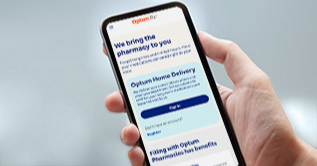Primary care services
Our primary care doctors specialize in supporting your everyday health needs, from regular checkups to caring for you when you're injured or ill.*
When choosing a primary care doctor, it's helpful to understand the difference between a family and internal medicine doctor. Both are considered primary care doctors and have training in several subspecialties. They serve as your first point of contact when a health issue comes up.
Some of the common conditions treated by our family medicine physicians include allergies, depression, insomnia, headache and sprains. Our internal medicine doctors provide services such as management of chronic conditions, mental health evaluations, immunizations and preventive care.

Video
Laurie’s story
Learn how Laurie found relief from lifelong health struggles with her Optum doctor.
Primary care FAQ
A primary care doctor, or PCP, is a doctor who handles your everyday health care. They can check on different parts of your health and connect you to specialists for more specific problems.
There are many ways to find a primary care doctor:
- Asking family and friends
- Checking online reviews
- Using an online search tool
After finding a doctor you’d like to try, it’s important to decide if they’re a good fit for you. Some things to think about include:
- How a doctor talks to you and explains things
- If they take your insurance
- Office environment
- Wait time
Is it time for you to think about switching to an Optum primary care doctor? Find out if you’re getting the right care by taking our healthier quiz.
How often you should see your primary care doctor for checkups is based on your age, risk factors and current health. Your annual wellness visit may be different from a physical or checkup.
Your doctor may suggest more or less time between your checkups based on your risk factors, screening test results and overall health. Check with your doctor to learn about screenings and how often to get them.
If you’re age 65 or older, you may also have an Annual Wellness Visit in addition to a yearly physical or checkup to talk about your health needs for the year.
If you need care outside normal office hours, your choices include:
- Virtual care: Meeting with your doctor using a computer, smartphone or tablet. It’s a safe, simple way to get care wherever you are.
- Urgent care: Meeting with a doctor, nurse practitioner or physician assistant for times when you need care right away. You don’t need an appointment and most locations offer extended hours.
Seeing a primary care doctor for your chronic condition can improve your quality of life. At the same time, getting preventive care can help keep you healthy and lessen the effects of a long-term illness.
Through scheduled visits, you and your doctor can stay connected. This leads to better care that’s easier for you.
Your primary care doctor can also take care of care gaps and make sure you’re getting the care you need when you need it.
Plus, your primary care doctor can help connect you with the right specialist to help you with chronic conditions:
- Arthritis, painful swelling of the joints or the place where two bones come together
- Asthma, a serious breathing illness
- COPD (chronic obstructive pulmonary disease), a serious lung problem that makes it hard to breathe
- Depression and anxiety (worrying more than normal)
- Diabetes, a condition when you have too much sugar in your blood which can lead to serious problems with your heart, kidneys, eyes, feet and nerves
- Gastrointestinal issues, such as acid reflux and IBS (irritable bowel syndrome)
- Headaches and migraines
- Heart disease
- High cholesterol
- Hypertension (high blood pressure)
- Kidney (organ that filters blood) disease
- Osteoporosis (weakening of the bones)
- Sleep disorders
- Thyroid (part of the body that sends out hormones, natural chemicals in the body that help it work) disorders
Internal medicine doctors can help adults with many conditions. Some of these may include:
- Allergies
- Cancer
- Diabetes
- Digestive disease
- High blood pressure
- Hypertension
- Infectious disease
- Pulmonary disease
You can also see an internal medicine doctor for help with:
- Family medicine
- Sick visits
- Wellness checks
- Food or seasonal allergies, hay fever, eczema, or other immune system issues
- Cancer checkups and ongoing care
- Care for diabetes, thyroid disease, or other hormone conditions
At Optum, we have over 85,000 doctors to meet your needs. Our primary care doctors are either a medical doctor (MD) or doctor of osteopathy (DO). MDs and DOs train with patients in medical school and residency programs.
When choosing between a MD or DO, it’s important to know that our primary care doctors work together to make sure you have a personalized care plan to meet your health goals.
At Optum, your primary care provider (PCP) can be a medical doctor (MD), doctor of osteopathy (DO), physician assistant (PA) or nurse practitioner (NP).
A PA is a licensed medical professional with an advanced degree. They’re able to provide direct patient care in almost all specialty and primary care settings. They can help you with common illnesses as well as do some minor procedures.
They provide expert care and try to make sure your wait time is shorter, all your needs are met and that you’re happy with your visit. They can give physical exams, diagnose illnesses, write prescriptions and work with you to create a care plan. Together with doctors and other members of your care team, PAs can provide both high-quality primary and specialty care.
Nurse practitioners (NPs) are registered nurses who provide a full range of care based on the patient’s needs. They can diagnose and treat both acute and chronic conditions, write prescriptions, order medical tests and help you understand the results. Many NPs try to help their patients practice better overall health, including healthy lifestyle changes and taking steps to prevent disease before it happens.
An NP is trained to:
- Look at your overall health
- Find out what kind of illness you may have
- Explain medical test results
- Prescribe medicines
- Work with other members of your care team
Our primary care doctors can help you with:
- Allergies and colds
- Minor back pain
- Skin conditions, such as acne and eczema
- Urinary tract infections (UTIs)
Our care teams offer a range of care and services, including:
- Help with medicines, including refills
- Lab tests
- Men’s health issues
- Obesity
- Ob/gyn care
- Regular checkups and wellness visits
- Screenings, such as mammograms (breast X-rays) and colonoscopies (an exam of the inside of the large intestine that uses a tube that bends easily with a camera at the end)
- Shots
- Stroke prevention
- Women’s health issues
Personalized care for you and your family
We don’t just care for you when you’re sick. We help you reach your personal health goals.
Adults ages 65 and older
We offer preventive care to help keep you healthy and feeling your best.
Adults under age 65
Get the right care, at the right time — at all stages of life.
Babies, kids and teens
Our pediatricians offer care for children of all ages, from newborns to older kids.
Take your next step

Searching for a doctor?
We have over 85,000 primary and specialty care doctors ready to provide care that's focused on you and made easier, all at a better value.

Need a specialist?
We help connect you to specialists who are proven to offer better outcomes.

Want health and wellness tips?
Looking for trusted advice that works? Find tips and ideas from our doctors for healthy living at any age, on topics important to you.
*Types of primary care vary by location. Check with your local Optum care team to see what’s available in your area.
Optum arranges for or provides medical and other clinical services in accordance with laws in each state it operates. Physicians or providers referenced on this website are to those who are either part of independent practices or to those medical practices managed by or owned, where permitted, by Optum. In all circumstances, physicians and other licensed professionals have complete authority for all medical decision-making and patient care. Optum does not determine or set the methods, standards, or conduct of the practice of medicine or health care provided by any of the practices or their physicians or other licensed professionals.




